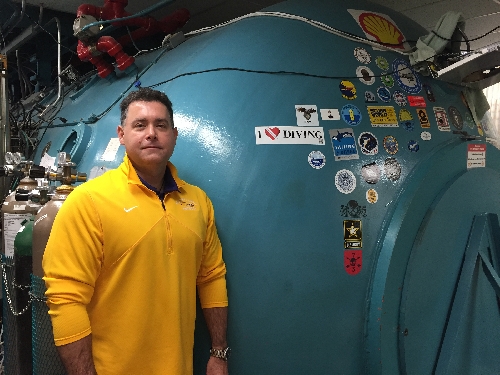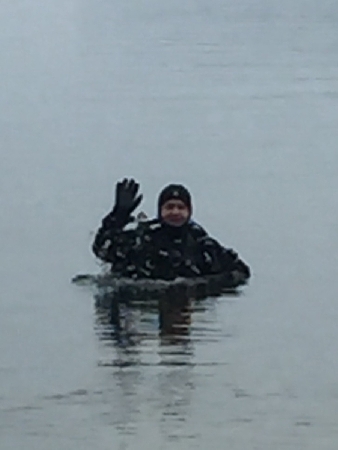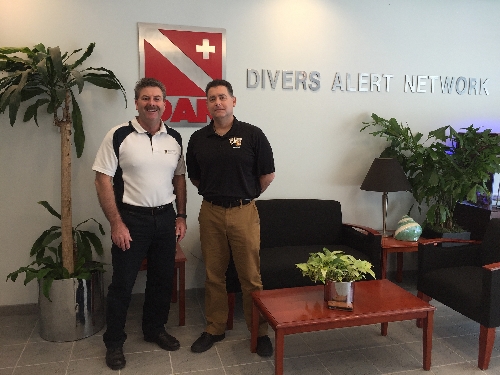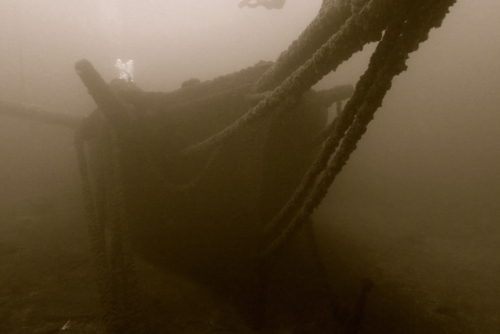University News
Scuba Diving Minor Provides Unique Opportunities for Kinesiology Faculty, WIU Students
March 21, 2016
MACOMB, IL — There may be a lot of reasons why Western Illinois University's Department of Kinesiology has a relatively high number of students in the department's scuba diving minor. According to the Office of the Registrar, as of Spring 2016, 48 students are enrolled in the minor program, which is one of only a very few academic scuba diving minors available in the United States.
One of those reasons a student may choose to enroll in the scuba diving minor at Western is due the fact that it is an academic minor—more than just a certification program (although the students who complete the minor coursework can be certified). Founded in 2008 by Dan Walter, kinesiology instructor and scuba program coordinator, the minor program (situated in the kinesiology department) at WIU offers a unique program of study that gives students real-world diving skills—and has been doing so for nearly half a century. While the minor became an official minor area of study in 2008, scuba diving has been taught by kinesiology faculty for more than 48 years.
"Today, Western's diving minor requires students to complete an extensive academic program, including 16 credit hours of coursework divided among four separate classes: KIN 108, 208, 308 and 408, which are all specific to dive training. It produces skilled divers because of the amount of time the students spend with Dan, learning about the skills they need," explained WIU Kinesiology Professor Christopher Kovacs.
Another reason students may minor in scuba may have to do with how they plan to use diving skills in their future careers, such as a student studying law enforcement and justice administration who may need to dive in the line of duty someday.
"Minoring in this program at Western has helped our students get jobs. There at least 27 students I know of who were qualified for positions—either jobs or internships—they applied for, and were offered and took, because of their scuba diving skills," Walter added.
Students may also be attracted to the scuba diving minor because of Walter's dedication to the program and commitment to creating diving opportunities for them. He not only teaches in the program, but he also organizes diving trips for students to a training quarry north of Macomb, as well as to diving locations in the U.S. and in the Caribbean (including a recent trip to the Bahamas during Spring Break 2016).
In March 2015, Kovacs and Walter published the article, "Scuba Diving and Kinesiology: Development of an Academic Program" in the Journal of Physical Education, Recreation and Dance to showcase the unique aspects of Western's scuba diving minor. Kovacs, who described Walter's work as "amazing," said Walter is the one who trained him how to dive years ago.
Kovacs' involvement in scuba diving at Western may provide yet another reason for students to study scuba diving at Western. Recently, he traveled to the Divers Alert Network, or DAN, headquarters in Durham (N.C.). There, Kovacs made in-person connections with the staff and researchers at the organization, which is the largest association of scuba divers in the world and has a mission of "helping divers in need of medical emergency assistance and to promoting dive safety through research, education, products and diving services."
Scuba Sabbatical = Success
While many may think of Cancun and corral reefs when they hear "scuba diving," Kovacs pointed out that diving encompasses more than just recreational diving, including commercial diving (for industries in need of divers for commercial purposes), military diving and technical diving.
"Technical diving is a more extreme type of diving, during which divers can be going into shipwrecks and other wrecks under the water," he added. "We're going down deeper in the water and staying there longer for what's called 'decompression diving.'"
Kovacs, who came to Western in 2005, has an academic background in exercise and sport science, exercise physiology, motor behavior and gerontology, so, for someone just glancing at his vita, it might seem strange he recently completed a sabbatical during which he concentrated on organizing data he has been collecting for approximately two years—all about diving. Upon hearing him talk about it, though, his passion for diving is clear.
"I am completely enamored with it, so it makes sense for me to study it. My research has to with exercise behaviors in divers, and it has come about from being out in the dive community and my observations on how the overall population (of those who do it regularly) is somewhat older. My background in gerontology probably has something to with my interest, and the fact, too, I often have witnessed many unhealthy aspects of the people in the diving profession or community," Kovacs noted. "So my research about it stems from what I love and what I am skilled at, as well how it all fits into my academic preparation."
Nearing the end of Kovacs' sabbatical last fall, he made a fortuitous connection with the DAN organization. That connection, which he made in person in late 2015, not only energized him for the semester this spring, but it has also propelled him—and Western's kinesiology department—toward a mutually beneficial relationship with the Durham-based DAN.
"DAN was formed at Duke University back in 1980, and it started as a hotline for divers. So if you're a diver and you experience some type of injury—and keep in mind that diving medicine is very specific—you can call DAN for help," he noted. "DAN links divers up with medical facilities and dive-trained physicians, so there is still that major piece of it, the DAN hotline."
Over the years, Kovacs explained, DAN has gradually become "the clearinghouse for dive research, medicine and safety"—an organization that aligns with Kovacs' academic and personal interests, which is why he contacted DAN last fall.
"I reached out to the researchers there, showed them my stuff and I was thrilled when they invited me down there," Kovacs said.
Kovacs traveled to Durham in early December, spending a few days getting to know some of the researchers based there, including Peter Buzzacott and Neal Pollock, both of whom are well-known in the diving community across the globe. In addition to meeting and talking about his research, Kovacs spent time listening to some of the calls coming into the hotline.
"People were calling in from all over the world. That was neat to see from the perspective of those nurses and emergency medical technicians answering the hotline calls. In many cases, I've been on the other end of that scenario, the diver thinking about making or the one making the call to DAN," he said.
While visiting DAN, Kovacs was also able to visit a hyperbaric oxygen chamber at Duke University.
"It was amazing. Neal Pollock is doing this NASA-funded research, looking at bubble formation in astronauts. So it's the opposite of research about going under the water; when astronauts go to altitude, and then they come back, they are having problems with bubble formation, which is also a problem with divers," Kovacs explained. "There is a lot of research about hyperbaric treatments for injuries like burns, wound care and/or rehabilitative treatments not necessarily related to in-water scuba diving or space travel. But the study of pressure effects on the body, which can be done with diving research, can be used in the medical community. While I was at Duke with Neal, I got to be in the chamber with the researchers when they were working with patients, as well as see the facility."
While in Durham, Kovacs presented, "Exercise Behavior in Divers: A Preliminary Report," and as a result, he is working with Buzzacott to publish an article in the academic journal Diving and Hyperbaric Medicine.
"I came back completely energized," he noted. "It was right in my wheelhouse, and I had the opportunity to not only get to know DAN's researchers, but I also will now be working with them on my research."
As for the benefits to Western, Kovacs said he made a point of promoting the WIU Department of Kinesiology's unique scuba diving minor and making a connection between the program and DAN.
"Every year, DAN offers a competitive internship for students. This year, Jocelyn Joseph [West Chicago, IL, a senior kinesiology major and scuba minor] applied for, and was accepted, for the DAN internship," Kovacs explained. "With her exercise science and scuba background, she is a perfect fit for this opportunity with DAN." (See "WIU Student Selected for Competitive Divers' Alert Network Internship in North Carolina.")
For more information about Western's scuba diving program, see www.wiu.edu/coehs/kinesiology/scuba/.
Posted By: Teresa Koltzenburg (WIUNews@wiu.edu)
Office of University Communications & Marketing





Connect with us: